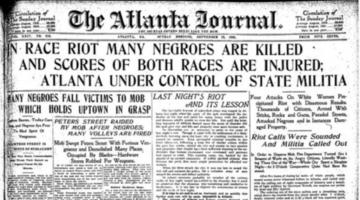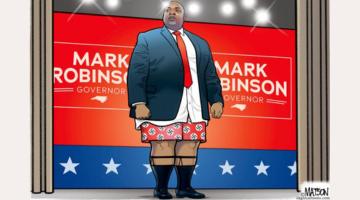Public reaction to the Fani Willis soap opera is an example of how cynical Black misleadership creates confusion among the masses.
“From my standpoint as a Black American, as far as I am concerned, it is high-tech lynching for uppity Blacks who in any way deign to think for themselves, to do for themselves, to have different ideas, and it is a message that, unless you kowtow to an old order, this is what will happen to you. You will be lynched, destroyed, caricatured by a committee of the US Senate, rather than hung from a tree.”
Clarence Thomas confirmation hearing 1991
“I’m not going to emasculate a Black man.”
Fani Willis
It is interesting that the scoundrels who happen to be Black know how to deflect from their misdeeds and get undeserved support from their people. The less any solidarity is deserved, the more blatant the effort to use Black trauma as a get out of jail free card.
Supreme Court Justice Clarence Thomas delivered quite a performance during his 1991 confirmation hearings. He defended himself against charges of sexual harassment by referring to his experience as a “hight tech lynching,” and in doing so he immediately won the support of many Black people who should have known better than to give him any credence for any reason whatsoever. A man whose politics were diametrically opposed to those of most in their group managed to turn himself into a heroic figure.
Thomas has lots of company in this regard, as Fani Willis has proven. Ms. Willis is the Fulton County, Georgia prosecutor overseeing the prosecution of Donald Trump and 18 other people who are accused of attempting to overturn 2020 election results in Georgia. She now faces racketeering charges.
But Willis’s career does not begin with Donald Trump. She first became a national public figure when she prosecuted 12 Black educators, charging them with racketeering for allegedly falsifying test scores in 2015, sending two of them to jail. There was no justification for a prosecution at all, and some of those charged still maintain their innocence yet still face jail time. Willis stands by the miscarriage of justice and brags, “I sit in that criticism, and y’all can put it in my obituary.”
Now Willis herself stands accused of improper behavior after hiring Nathan Wade, a man with whom she had a romantic relationship, to serve on the Trump prosecution team. When rumors of their relationship proved to be true, defense attorneys requested her removal from the case, alleging a conflict of interest.
Having made an unwise decision to combine business with pleasure, Willis is left only with performance, and perform she did at an evidentiary hearing. Like Clarence Thomas, she is a scoundrel, and like him she knows her people very well.
The request to have her removed from the case hinges in part on whether or not she paid Wade for her share of vacations they took together. “A man is not a plan, a man is a companion,” she proclaimed and single handedly connected with women who treasure their independence while still seeking romantic relationships. Of course one of the legal issues is whether or not there was a monetary quid pro quo between Willis and Wade. Willis claims she paid Wade for her share of their travels but she doesn’t have proof of her payments because they were made in cash. Why were they made in cash? Well, because that’s what Black people do, according to Willis anyway. Her father, also an attorney, testified to her assertion that Black people keep a lot of cash on hand. It’s a Black thing apparently.
There was humor in the proceedings, but what isn’t funny is how well her questionable claims resonated with many Black people. In the 21st century many of us are still in the thrall of a Black face in a high place, and can’t extricate ourselves from the mentality of the segregation era and discern who is and who is not deserving of being given a pass for the sake of racial solidarity.
The bigger problem with Willis is what is known as the “Atlanta way.” This mythical arrangement is said to make Atlanta a “good for Black people” locale with mayors, senators, and prosecutors. They can do well, if they act as directed by wealthy and powerful white people.
The end result is Cop City, a so-called public safety training center which Black Atlantans do not want but which their leadership is shoving down their throats. One protester was shot dead by police, others have had their homes raided and been speciously charged with racketeering. Protest has been criminalized because rich, white Atlantans want Cop City and Black figure heads do as they are told.
While Willis was engaged in a soap opera of her own making, Georgia Senator Raphael Warnock was meeting the president of Ukraine, an act which, by definition, is bad for the people of this country. “Good to spend some time in Munich today with President Zelesnky. It is in our own national security interest to stand with Ukraine. I was proud to pass critical funding for Ukraine and our allies for freedom in the Senate this week. Let’s get it done in the House.”
The election of a Black senator was supposed to be a good thing for Atlantans but instead they get the same treatment as everyone else. Thanks to Warnock and his colleagues, their public money goes to the military industrial complex and to crooked Ukrainian oligarchs. Atlanta might actually be the “not so good for Black people” city.
Willis has been hoisted on her own petard and too many Black people feel the need to hang out there with her when they should be disinterested observers. Clarence Thomas is one of the most conservative justices in history who is also bought off by billionaires. If anyone was lynched it was the rest of Black America, who should know by now not to fall for con men and women who are skinfolk but not kinfolk.
Margaret Kimberley is the author of Prejudential: Black America and the Presidents. You can support her work on Patreon and also find it on the Twitter, Bluesky, and Telegram platforms. She can be reached via email at margaret.kimberley@blackagendareport.com.



















